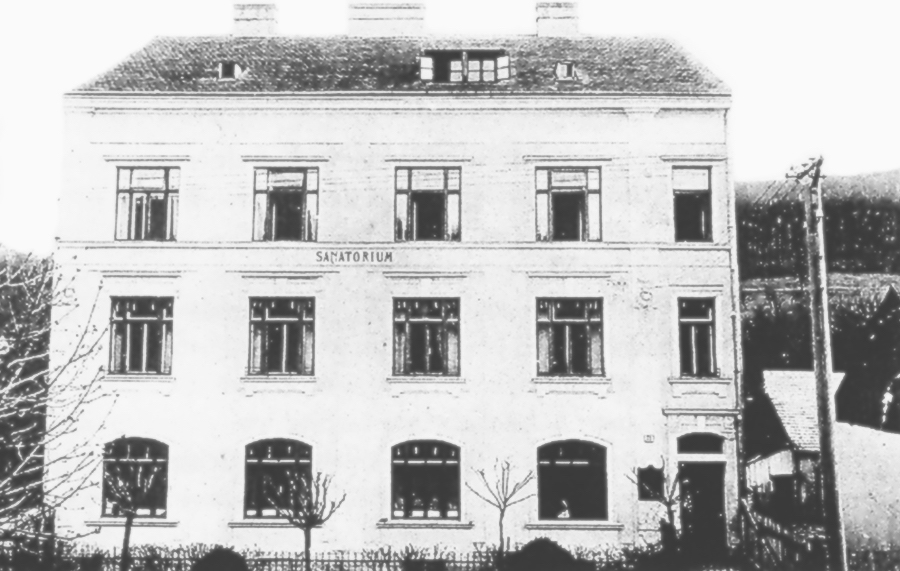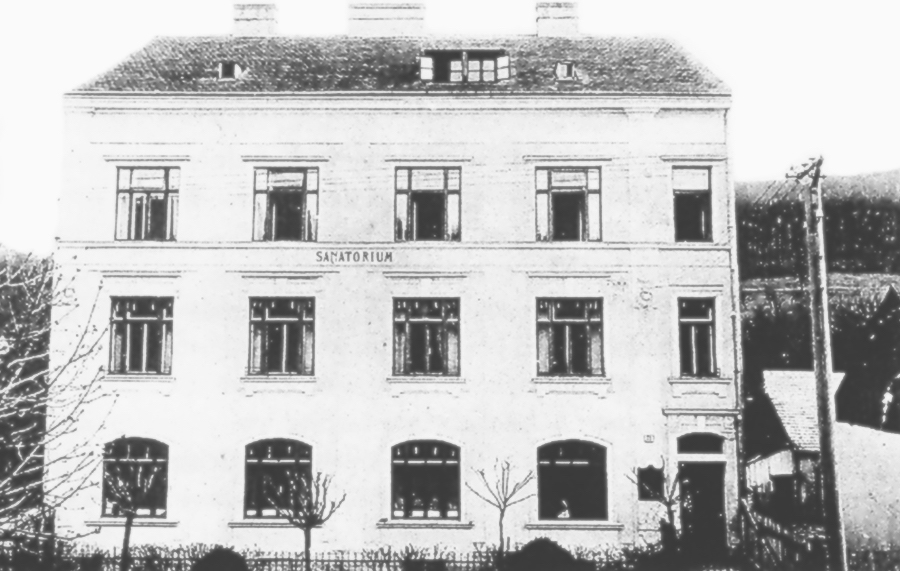Ma Picks a Priest
by Marianne Leone
“I rest my case.”
My sister, Lindy, thrust a statue of Saint Anthony in my face, tick-tocking him like a metronome. Saint Anthony was wearing a rakish pink scrunchie stuffed with red and yellow artificial flowers around his waist. We were arguing about holy cards and which saint Ma would want on hers. I had pushed Saint Rocco in honor of Ma’s part-time job booking illegal numbers for the local wise guys. I thought I remembered her telling me that Saint Rocco was the patron saint of gambling. He was often depicted as a ragged man with bleeding leg sores being licked by a faithful dog. (I later found out that he was invoked to ward off infectious diseases.) I supported my vote for Saint Rocco with the fact that Ma had a statue of him right by her bed. My sister pointed out that Saint Anthony was there, too. So was Saint Jude, a flame shooting out of his head like he had just been electrocuted, and Saint Francis, decked out like a mad pigeon lady in Central Park with birds clinging all over his monk’s robes, even covering his privates. But Saint Anthony had the scrunchie with the flowers. And Ma had put it there herself.
“Look at him. He’s decorated,” my sister said. We both cracked up. Then we cried. Again.
We had been on an emotional roller coaster for two days now, ever since Ma died suddenly at the age of eighty-four. The doctors said it was a cerebral hemorrhage. She woke up with a headache and was dead by two the same afternoon. Ma would’ve liked the idea of leaving in such a hurry, like one of our childhood Christmas trees that was stripped and tossed every year the day after Christmas, at her urgent behest.
Now my brother Michael, Lindy, and I were orchestrating the wake and funeral, checking off chores with the same haste as we used to devour desserts, Ma waiting impatiently to clear the dinner table. Apart from the quibble about her favorite saint, we knew exactly what to do. From birth to marriage to death, there was a clear trajectory if you lived in the Lake, an Italian-American part of Newton, Massachusetts, where the circle of life had a really tiny radius. You were baptized at Our Lady Help of Christians Church, you got your wedding dress at La Sposa, you were laid out across the street at Magni’s Funeral Home, and your funeral Mass sendoff returned you to Our Lady Help of Christians Church.
Andrew Magni led us through the downstairs coffin display. We bypassed the over-the-top one with the carved version of the Last Supper on the cover, paused briefly by the hot pink number so my sister and I could instant eyebrow message each other, and settled finally on a shiny metal canister with a coppery glint. Back in his office, Andrew informed us that none of the regular priests at Our Lady’s were available and we would have a substitute to say Ma’s funeral Mass from the next parish over, St. Bernard’s. The name of the parish rang a tiny, distant bell muffled by my memory of Ma’s last non-encounter with priests a few months before she died.
We were at Newton-Wellesley hospital. Ma had complained of a headache and partial loss of vision in one eye and the doctors wanted to make sure she hadn’t had a small stroke. I stayed with her so that her spotty English language skills wouldn’t make her seem unhinged to the medical staff; they were testing her mental competence with questions about what day it was, what month, and what year. She answered correctly. They asked her who was the current president that year, 2004.
“Eh. I can’ remember his name, but I know he’s a basta!”
I looked at the hospital personnel.
“You can’t possibly question her sanity now.”
Nevertheless, the doctors decided to keep Ma overnight. They sent in a very young, squeaky-voiced hospital clerk, who rattled off a list of questions in a fatally bored voice.
“Religious Affiliation?”
Ma looked at me and shrugged.
“What’s ‘e want?”
“He wants to know if you want to see a priest.”
Ma’s voice was strong, resolute.
“No. No priest.”
I turned to Squeaky.
“You got that? No priests.”
Squeaky didn’t realize that to my mother it was as if he’d asked:
“And would you like to have a visit from the Angel of Death?”
Later, I settled Ma in her intensive care room-there were no beds available in the regular part of the hospital. She relaxed, lulled by the electronic wallpaper of the television mounted in the corner. Restless, I wandered into the hall. I stopped at the neighboring cubicle, listening as a priest droned the “Our Father” to a frightened, demented old woman who was emitting cries of alarm like a baby bird dislodged from the nest. I edged closer. “Home. Home,” the old woman cried. She lay huddled on her bed in a wilted heap, barely distinguishable from the bedclothes. The priest sat four feet away and recited his prayer as if he were alone in the room, as if he were direct-dialing his old buddy God for a dinner date, as if the old woman were already dead.
Ma was right about priests, I thought.
About a month after the hospital event, I was on a flight from Los Angeles heading home to Boston. We were in first class, courtesy of the studio that was promoting my husband, Chris’ film. I sat beside an entitled middle-aged guy who wasn’t about to give up his window seat so I could sit with Chris. That was okay. Chris and I could survive five hours one row apart. And we were in first class. Who was I to complain when there were warm cookies available and I had actual legroom? Just six rows back in the economy gulag there were cramped throngs with serious future chiropractor bills looming and no warm cookies. I didn’t hold it against the window-hugging guy, and over lunch we made polite small talk. I asked him why he had been to LA. He said he was at a religious convention.
“Oh, really? What do you do?” I asked brightly, with only a tinge of heart-sink at the word “religious.” I knew that my own contentious nature and the twelve years I put in as a parochial school POW would inexorably draw me into talking about religion. I was a lemming in sight of the cliff.
“I’m a priest,” he said, with a kind of mock sheepishness, like he was revealing unwillingly his superpowers.
I leapt off the cliff.
“I hope you don’t think you’re more spiritual than I am because you have a penis and can change water into wine.”
That came out so abruptly I almost looked around to see who said it.
The priest raised his arm for the stewardess like he was bestowing a blessing.
“I’ll have a scotch, please.”
Over the next five hours we discussed my theory of the imminent demise of the Catholic church. Well, I scattershot bullet points at the priest, and he dodged them. It was strange. I remembered the worshipful way the nuns would ask the priests if they would give us a blessing back in high school when they visited our classrooms. The nuns would duck their heads girlishly and we students fell obediently to our knees in a thudding horde. They had a glamour then, the priests. They handled God every day. A tiny, retro part of myself wanted the God spillover from the guy sitting next to me in the window seat. But I also wanted him to explain to me why any woman would want to join a club that from birth designated her as a second-class citizen. He talked about the programs he was involved in for troubled youth. I talked about the Magdalene laundries in Ireland, the Catholic-run slave-labor institutions for unwed mothers that only closed in the nineties. I asked if his youth programs were like that. He kept ordering scotches. Even though he was the one drinking scotch, my memory of the rest of the discussion is hazy, though I know it touched upon my years of torment in parochial school, the priest pedophile scandals, and my gratitude to renaissance cardinals for commissioning 3-D pornography from artists like Bernini so that we could today view Italian sculptures of women in “spiritual” ecstasy, like Santa Ludovica and Teresa of Avila.
What I couldn’t remember now, at Magni’s Funeral Home was the name of the parish to which my sacerdotal seatmate had said he belonged. But I didn’t dwell on the priest. I thought instead of Ma, her fierceness stilled forever, on display in her burnished copper casket. I remembered asking her on New Year’s Day what her resolution was for 2004, and her growly answer: “to be dead this year.” And then her practiced hold for my laugh, her timing as polished as any late-night comedian’s. Her pitch-black humor, which had taken seed in the arid mountain soil of her impoverished girlhood, was as gnarled and twisted as the Montepulciano grape arbors of that region, and as dry and delicious as the dark wine they produced. I don’t remember ever hearing a belly laugh from Ma. She favored the snort of derision, the head toss, the “ha!” that was more like a spoken confirmation that she got the joke. As measured as her own laughter was, she was sly about amusing her audience. She knew she was funny but she always played it straight. She acted the innocent, watching us laugh, eyelids at half-mast, appraising the reactions. Ma would never make me laugh again, I thought.
On the day of the Ma’s funeral I entered the church as the substitute priest was setting up shop for the requiem Mass he was about to say. [I’m not entirely clear why the paragraph below is separate from the one above. Author’s decision, of course, but my impulse is to make it one.]
It was my scotch-drinking seatmate from the plane.
I snorted with laughter, shaking my head, my laugh a replica of my mother’s. I was wrong about Ma making me laugh again.


